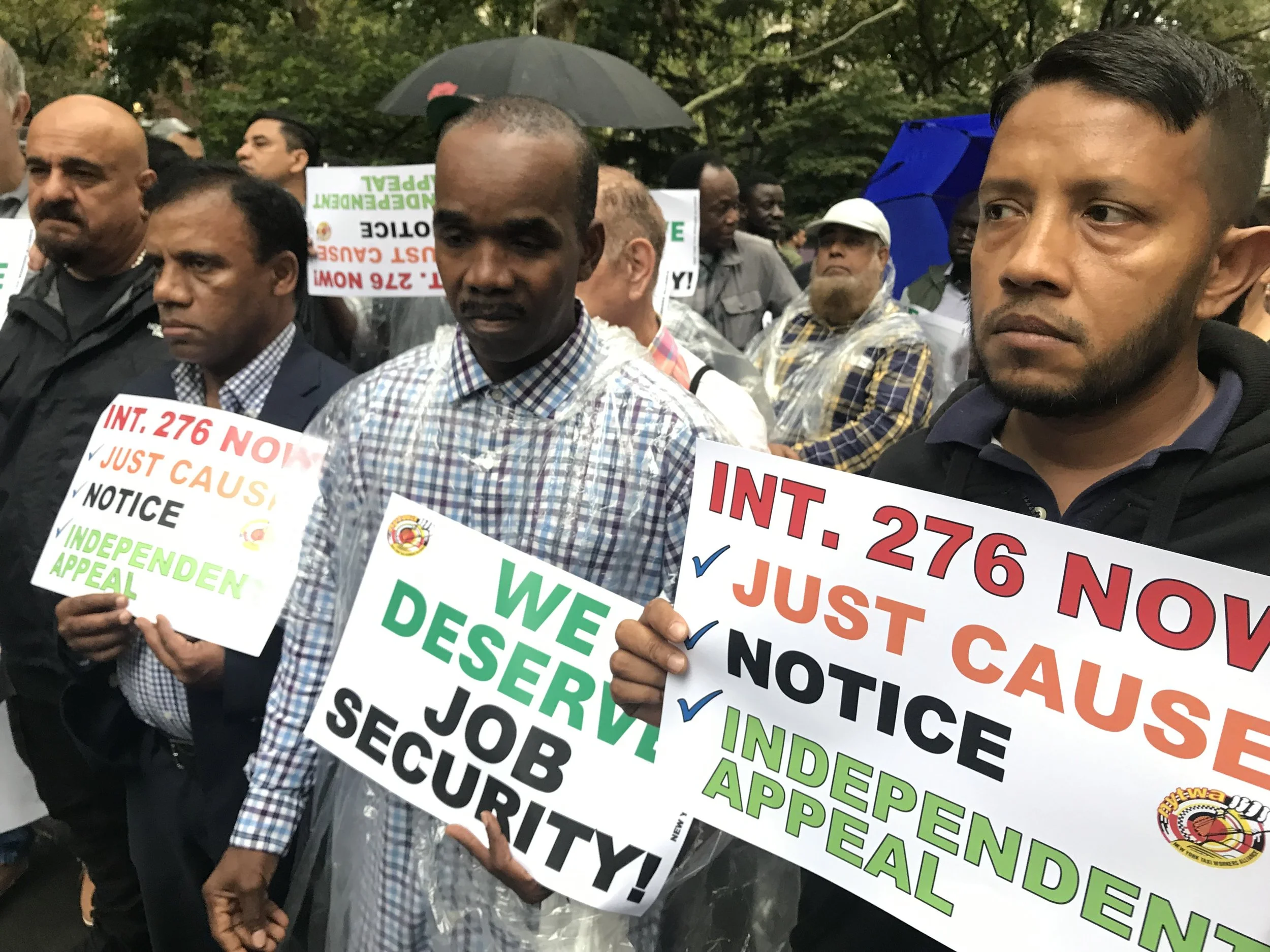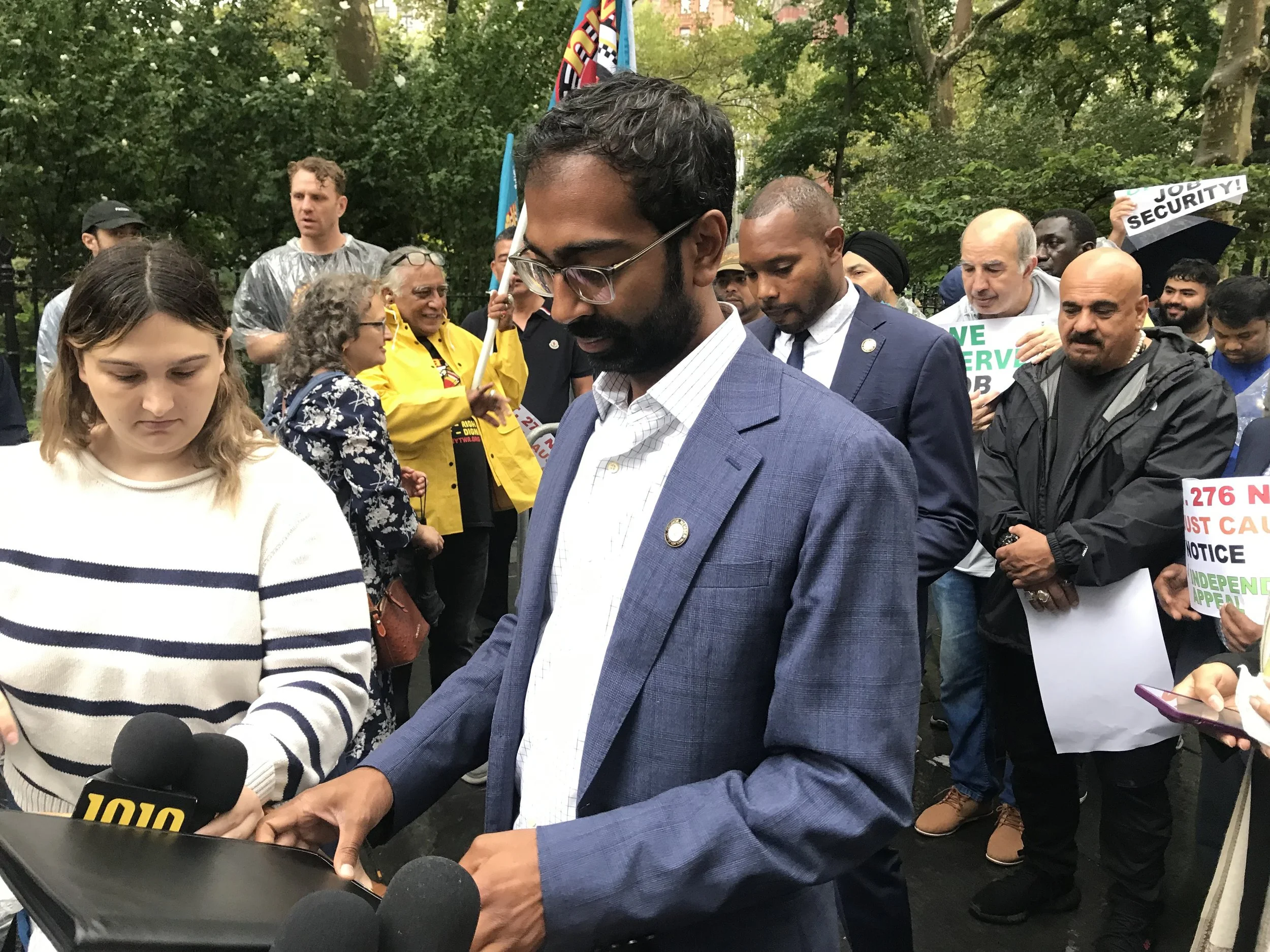App Drivers Demand NYC Law Protecting Their Rights
New York City app drivers rally this past week in support of Intro. 276.
By Steve Wishnia
With the legislative clock ticking down toward the end of the year, scores of Uber and Lyft drivers rallied in the rain near City Hall Sept. 25, demanding that the City Council pass a bill to protect them against being fired without good cause and due process.
The Council held a hearing on the bill, Intro 276, in September 2024, but has not taken any action since then. If it is not passed this year, it would have to be reintroduced next year and wait to get another hearing. The rally was intended to “keep up the pressure” on the Council, New York Taxi Workers Alliance head Bhairavi Desai told Work-Bites, both for a vote and for its due-process provisions “to remain intact.”
Quasi Bayzid, who’s driven for both Uber and Lyft for the past seven or eight years, says he’s seen drivers with 10 or 15 years on the job suddenly “deactivated,” their access to the app cut off without any reason given. He’s maintained a perfect five-star rating with both companies, he told Work-Bites, “but I don’t know if I’ll be able to drive tomorrow.”
“They don’t give any trust to the drivers,” Bayzid said. “They are a monopoly.” He said the city has to intervene.
Intro 276, sponsored by Councilmember Shekar Krishnan (D-Queens), is inspired by the city’s 2020 law barring fast-food employers from firing workers without a good cause. It would make it illegal for Uber and Lyft to fire drivers without just cause and, in non-egregious cases, without 14 days advance notice or progressive discipline. They could still fire drivers immediately for “egregious” misconduct such as driving with a suspended license. They would have to give 120 days’ notice of layoffs for “bona fide economic reasons.”
Krishnan told the rally that ending unfair deactivations is the biggest fight drivers have faced since the medallion crisis. Intro 276, he said, creates “a fair process,” in which drivers could contest being terminated “before it happens,” instead of the app-cab companies being “judge and jury.”
Uber driver Chigozirim Ahuruonye said he had been fired without just cause in 2020, after he had taken out a $15,000 loan to buy a vehicle he could use as a cab, and put more money in to install a partition during the peak of the COVID pandemic. But that September, he said, he’d picked up a woman fare who first insulted him after he told her not to put her feet on the seat. She then asked to be dropped off at a different destination, which he said he wasn’t allowed to do without the account owner changing it on the app, so she complained to Uber about him.
Councilmember Shekar Krishnan: “We are a Council that stands up for workers, not billion-dollar app companies.”
Losing the income resulted in him getting evicted from his apartment and falling behind in his child-support payments, he added. “No driver deserves this.”
Intro 276 now has 17 sponsors. Desai says that she’s been told that Council Speaker Adrienne Adams is getting ready to bring it to a vote. That it got this far, she says, “is remarkable, given how monied our opponent is.” Now, the challenge is preventing the measure from being amended to weaken its due-process requirements such as just cause, notice of allegations, progressive discipline, and the right to appeal to an independent panel.
Bayzid agreed that drivers having the right to appeal to an independent, city-run board was a crucial part of being able to protect themselves against “false accusations.”
In last year’s hearing, Lyft opposed Intro 276, saying that it “creates an excessive burden of proof that could force victims of crime to relive traumatic events by providing testimony or risk the driver being allowed back on the platform.” Uber, on the other hand, called for changes such as reducing the 14-day warning-notice period to three days or less.
Lyft does not even maintain an office in New York City, its biggest market, Desai notes. It “had the resources to sue against minimum-pay rules, but now claim they do not have the resources to investigate before depriving a driver of his livelihood.”
“It’s unconscionable that the workers who move our city forward–who pour thousands of dollars into their cars for maintenance and insurance and often work more than full time to make ends meet, can be fired without notice and cause,” Krishnan said in a statement to Work-Bites. “Intro 276 gives New York City's largest private-sector workforce, app-based drivers, their power back, and we will pass this legislation. We are a Council that stands up for workers, not billion-dollar app companies.”


